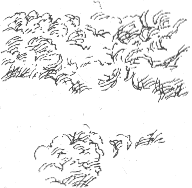|   Yesterday
I mentioned to Barbara that, while going through my old sketchbooks, I'd
come across drawings of a buzzard swooping. At first
I'd thought they must have been drawn in Cumbria, then I remembered; two
years ago we had buzzards here in the valley. They nested in woodland
in open country a few miles to the south but they seemed to include the
valley as part of their regular beat. Yesterday
I mentioned to Barbara that, while going through my old sketchbooks, I'd
come across drawings of a buzzard swooping. At first
I'd thought they must have been drawn in Cumbria, then I remembered; two
years ago we had buzzards here in the valley. They nested in woodland
in open country a few miles to the south but they seemed to include the
valley as part of their regular beat.
'I thought they'd become a regular sight around here,' I said to Barbara,
'but we haven't seen them since.'
Talk of the devil: this morning, as we were sitting having coffee with
my mum, I saw a distant silhouette circling out over the Calder valley;
the first buzzard we've seen around here since the summer of 2003. With
binoculars we could see light patches on its wings.
The Behaviour of Shapes
|
|
 While
I'm working on writing and designing my garden book I find I can't
settle down to drawing. I'd prefer to do something light-hearted
and mindless; an animation. While
I'm working on writing and designing my garden book I find I can't
settle down to drawing. I'd prefer to do something light-hearted
and mindless; an animation.
Using every one of the stencils on this ruler (from Guernsey),
I marked twelve frames on a sheet of A4 paper then started with
the central square and triangle as an anchor point. As I added the
other shapes, I gave each a behaviour:
-
the right triangle doubles the distance it moves upwards in
each frame: one millimetre in frame 2, two millimetres in frame
3, four in frame 4 etc.
-
the circle 'wants' to stay in contact with the triangles
-
the small circles react to gravity, finding the lowest point
in whatever shape they're in
-
and so on
I feel that I could extend this kind of doodling to produce a walking
robot, or a castle with drawbridge and porcullis.
The idea of assigning behaviour to shapes reminds me of computer
programming or of the behaviour of fundemental particles, but also
of Marcel Duchamp's mechanical surrealism and Paul Klee's floating
creatures reacting to each other in a primeval world.
 |
Richard Bell, richard@willowisland.co.uk
|